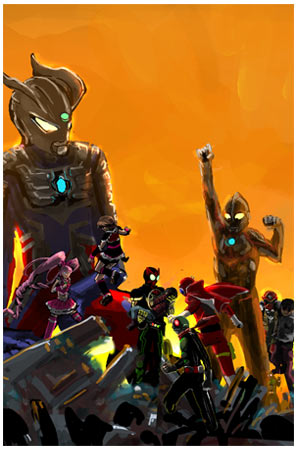Japan’s crisis continues, though things are slowly coming under control. As calm returns and companies work hard to normalize the situation, food distribution is getting better, and the convenience store I checked had shelves overflowing with bread, which had been in short supply a few days before. In the more heavily damaged northern regions, of course, the sadness continues to unfold, as the damage is assessed and body counts are totaled. A huge amount of help continues to pour in, with large donations announced by famous businessmen (Uniqlo founder Tadashi Yanai, Johnny’s Talent Agency), JPOP and KPOP performers (Ayumi Hamasaki, AKB48, KARA, Bae Yong Joon), sports figures (Ichiro) and more, but Japan will need more help to recover. Many famous artists and anime companies have picked up on the meme of creating earthquake-related art and posting it to their websites and Pixiv to console those affected by the disaster, and I continue posting it to my Twitter feed and J-List’s official Facebook page.There’s been a lot of discussion about the reporting of the disaster by foreign news sources, which sometimes over-dramatize the situation with sensationalist language to make it more exciting and increase their page views, or (as various Japanese have pointed out) view the situation through Hollywood-colored spectacles. While the disaster has been unprecedented, I have yet to see Japanese news reports using excited language, anointing the brave workers at the Fukushima plant with titles like “the Fukushima Fifty” to add to the drama (in reality, there are more than fifty engineers in the Fukushima power plants and they’re constantly being rotated out in shifts). It’s got to be a challenge for foreign Western news reporters to come up with angles for their stories, since the Japanese don’t behave as the reporters expect, acting calm with very little panicking — heck, the only case of looting was me, raiding the J-List stock of instant ramen when I forgot to bring my lunch the other day.Yes, the Japanese news reports have been much calmer, reporting the facts and telling people what they should be doing without getting them too excited. As the eternal wisdom “you’ve been in Japan too long when NHK warnings about landslides, heavy rains, and other disasters make you feel reassured that someone is benevolently watching over you” shows, this is part of the role of NHK, Japan’s public broadcasting system, essentially a great clone of the BBC. NHK has been the best source of information for people inside Japan during the crisis, and during the blackouts there’s been little else to do than listen to NHK news programs on AM radio. During one broadcast, there was a “radio essay” by a commentator who pointed out some of the good things coming from the current mess. Because of the gasoline shortage, he had walked to work instead of driving, and he found himself having the most interesting conversations with people in his neighborhood while waiting at the train crossing. He found that he’d rediscovered the lost art of having conversations with his family, while everyone huddled in a candlelit room in the dark, no Playstation to distract the kids. Another small good thing about the current crisis is that it gives young people a small taste of what their grandparents endured during World War II.There have been reports of an exodus of foreigners from Japan, as gaijin employees of foreign companies evacuate their staff, and other foreigners working in Japan decide to head to safer locations, either inside Japan away from the Kanto (Tokyo) area or back to their home countries. I certainly understand the fear they feel, but I’m betting that Japan will right itself soon and bounce back better than ever, even with the release of limited amounts of radiation (which has been approximately 1/333,333 the radiation released from Chernobyl). In the end I look at the Japanese themselves, and know things will be okay. If Tsutomu Yamaguchi — the man who was present in Hiroshima during the bombing then returned to his home in Nagasaki only have that city bombed three days later — could live to the ripe age of 93, most of us will come through this fine.The irony is that I’m currently in San Diego, where I’ve come with my daughter. Not to escape current events in Japan, but to attend an important family event that had been planned several months in the past. I’ll be getting back to Japan in two weeks, and believe me, I can’t wait to get back to where I’m needed. orz

Japan’s heroes work hard to save lives.














